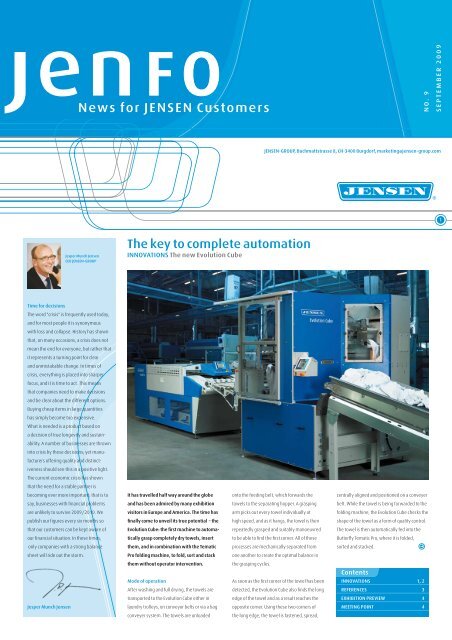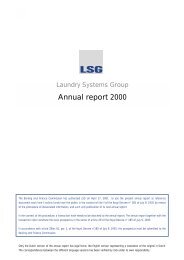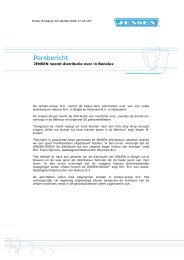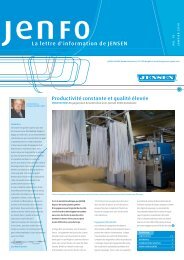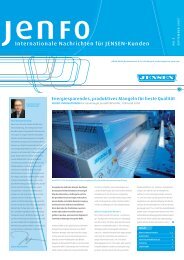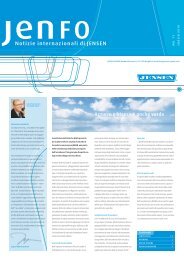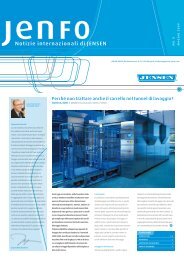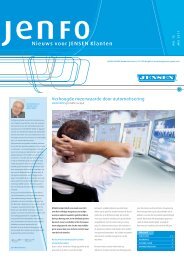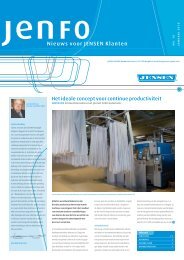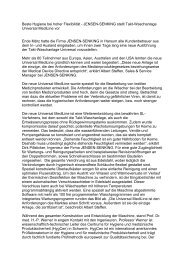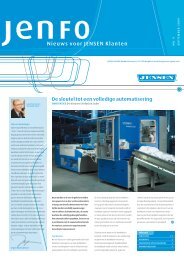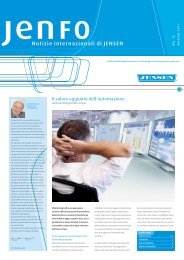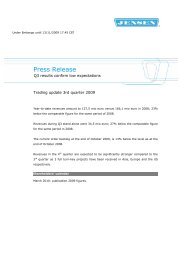News for JeNseN Customers - Jensen Group
News for JeNseN Customers - Jensen Group
News for JeNseN Customers - Jensen Group
You also want an ePaper? Increase the reach of your titles
YUMPU automatically turns print PDFs into web optimized ePapers that Google loves.
time <strong>for</strong> decisions<br />
<strong>News</strong> <strong>for</strong> <strong>JeNseN</strong> <strong>Customers</strong><br />
Jesper munch <strong>Jensen</strong><br />
CeO <strong>JeNseN</strong>-GrOUp<br />
The word "crisis" is frequently used today,<br />
and <strong>for</strong> most people it is synonymous<br />
with loss and collapse. History has shown<br />
that, on many occasions, a crisis does not<br />
mean the end <strong>for</strong> everyone, but rather that<br />
it represents a turning point <strong>for</strong> clear<br />
and unmistakable change. In times of<br />
crisis, everything is placed into sharper<br />
focus, and it is time to act. This means<br />
that companies need to make decisions<br />
and be clear about the different options.<br />
Buying cheap items in large quantities<br />
has simply become too expensive.<br />
What is needed is a product based on<br />
a decision of true longevity and sustainability.<br />
A number of businesses are thrown<br />
into crisis by these decisions; yet manufacturers<br />
offering quality and distinctiveness<br />
should see this in a positive light.<br />
The current economic crisis has shown<br />
that the need <strong>for</strong> a stable partner is<br />
becoming ever more important; that is to<br />
say, businesses with financial problems<br />
are unlikely to survive 2009/2010. We<br />
publish our figures every six months so<br />
that our customers can be kept aware of<br />
our financial situation. In these times,<br />
only companies with a strong balance<br />
sheet will ride out the storm.<br />
Jesper munch <strong>Jensen</strong><br />
the key to complete automation<br />
INNOVAtIONs the new evolution Cube<br />
It has travelled half way around the globe<br />
and has been admired by many exhibition<br />
visitors in Europe and America. The time has<br />
finally come to unveil its true potential – the<br />
Evolution Cube: the first machine to automatically<br />
grasp completely dry towels, insert<br />
them, and in combination with the Tematic<br />
Pro folding machine, to fold, sort and stack<br />
them without operator intervention.<br />
Mode of operation<br />
After washing and full drying, the towels are<br />
transported to the Evolution Cube either in<br />
laundry trolleys, on conveyor belts or via a bag<br />
conveyer system. The towels are unloaded<br />
N O. 9<br />
<strong>JeNseN</strong>-GrOUp, buchmattstrasse 8, CH-3400 burgdorf, marketing@jensen-group.com<br />
onto the feeding belt, which <strong>for</strong>wards the<br />
towels to the separating hopper. A grasping<br />
arm picks out every towel individually at<br />
high speed, and as it hangs, the towel is then<br />
repeatedly grasped and suitably manoeuvred<br />
to be able to find the first corner. All of these<br />
processes are mechanically separated from<br />
one another to create the optimal balance in<br />
the grasping cycles.<br />
As soon as the first corner of the towel has been<br />
detected, the Evolution Cube also finds the long<br />
edge of the towel and as a result reaches the<br />
opposite corner. Using these two corners of<br />
the long edge, the towel is fastened, spread,<br />
centrally aligned and positioned on a conveyer<br />
belt. While the towel is being <strong>for</strong>warded to the<br />
folding machine, the Evolution Cube checks the<br />
shape of the towel as a <strong>for</strong>m of quality control.<br />
The towel is then automatically fed into the<br />
Butterfly Tematic Pro, where it is folded,<br />
sorted and stacked.<br />
Contents<br />
INNOVAtIONs 1, 2<br />
refereNCes 3<br />
eXHIbItION preVIeW 4<br />
meetING pOINt 4<br />
september 2009<br />
1
2<br />
Design<br />
There are currently two versions of the<br />
Evolution Cube available:<br />
1. Batch processing with a towel size that<br />
corresponds to predefined measurements<br />
2. Mixed processing with a maximum of two<br />
different towel sizes that correspond to<br />
predefined measurements<br />
To be able to run the system as flexibly as possible,<br />
a fold-away transfer table can also be supplied,<br />
which enables manual feeding into the<br />
Tematic Pro towel folding machine. The foldaway<br />
transfer table with feeding belt ensures<br />
operating safety and allows <strong>for</strong> interim feeding<br />
and folding of special laundry items that cannot<br />
be processed using the Evolution Cube.<br />
If the Evolution Cube cannot recognize or grasp<br />
the towel corner <strong>for</strong> some reason, the dropped<br />
laundry item is automatically sent back to the<br />
start of the process via an integrated return<br />
belt, i.e. into the separating hopper. This itemreturn<br />
system means that it is not necessary<br />
to remove towels from the machine by hand.<br />
In effect, the Evolution Cube resolves<br />
its detection or grasping errors itself.<br />
Quality control<br />
One could of course assume that quality control<br />
by means of human inspection during manual<br />
feeding of towels would also be eliminated due<br />
to the rationalization of operating personnel.<br />
In this regard, JENSEN is working on automatic<br />
quality control using a camera system that<br />
identifies damaged or soiled towels and<br />
initiates sorting of these items.<br />
Output<br />
Depending on the towel size and the textile<br />
quality and thickness, the Evolution Cube can<br />
process between 400 and 600 towels per hour<br />
as a daily average. The towels should con<strong>for</strong>m<br />
to the following dimensions:<br />
Minimum size: 900 x 500 mm (35.4 ” x 19.7 ”)<br />
Maximum size: 1200 x 600 mm (47.2 ” x 23.6 ”)<br />
Application<br />
Due to its lack of dependence on operating<br />
personnel, the Evolution Cube is particularly<br />
suited to multi-shift operation. It is naturally<br />
advisable to have a single person monitoring<br />
the overall process when operating multiple<br />
Evolution Cubes. The Evolution Cube is primarily<br />
used in central laundries <strong>for</strong> hospitals and textile<br />
rental companies that process standardized<br />
hotel linen. Currently, the Evolution Cube can<br />
process standardized dry laundry corresponding<br />
to the a<strong>for</strong>ementioned dimensions on a<br />
viable, productive basis. After the next devel-<br />
opmental stage, the Evolution Cube should<br />
meet the requirements of hotel laundries that<br />
process textiles of a different quality and, more<br />
importantly, a wide range of different textiles.<br />
Combination<br />
Laundry items not con<strong>for</strong>ming to the indicated<br />
dimensions, as well as thicker items such as<br />
shower mats, are folded manually using the<br />
Tematic Pro. Hand towels and bath towels<br />
are processed using the Evolution Cube. Pre-<br />
sorting of towels be<strong>for</strong>e the finishing process<br />
can also increase the dryer output. Basically<br />
all dry laundry items should be automatically<br />
fed to the folding stations via a bag conveyor<br />
system, and removed in a precisely stacked<br />
manner by means of a Jenway conveyer belt<br />
system in order to obtain an ideal process<br />
flow. When processing 50% standardized and<br />
50% other types of dry laundry, two Evolution<br />
Cubes, each with one integrated and two freestanding<br />
Tematic Pro folding machines could<br />
1200 mm (47")<br />
be installed. It is not absolutely necessary to<br />
purchase an Evolution Cube together with a<br />
new Tematic Pro if the latter item is already<br />
available in the laundry. The Evolution Cube<br />
can be connected to an existing, recently<br />
produced Tematic Pro; however, in this case<br />
the software must be updated. To achieve<br />
maximum capability, an overhaul of the<br />
existing Tematic Pro is recommended. This<br />
can be per<strong>for</strong>med by JENSEN service technicians<br />
during commissioning.<br />
1. After grasping the first corner … 2. ... the second corner is fastened over the longitudinal edge.<br />
3. the towel is aligned at the longitudinal edge … 4. ...grasped at the short edge and fed into the tematic pro.<br />
1755 mm 69")<br />
620 mm (24")<br />
440 mm (17")<br />
Height adjustable<br />
conveyor belt<br />
Return system <strong>for</strong><br />
lost items<br />
Centering and aligning<br />
4465 mm (176")<br />
Evolution Cube Tematic Pro<br />
Loading point /<br />
Separating shaft<br />
3425 mm (135") 3720 mm (146")<br />
Fold-away transfer table <strong>for</strong><br />
manual feeding of Tematic Pro<br />
Folding and stacking<br />
840 mm (33")<br />
475 mm (19")<br />
1325 mm (52")<br />
Height of Evolution Cube: 2350 mm<br />
Height of Tematic Pro: 1410 mm
N O. 9<br />
september 2009<br />
efficient and precise laundry management <strong>for</strong> satisfied customers<br />
refereNCes A&M Blanchisserie Basse Meuse S.A., Liège, Belgium<br />
Joseph broers and his son marc broers, General manager of A&m blanchisserie basse meuse . Absolute control with the futurail counting and sorting system <strong>for</strong> restaurant linen.<br />
The Broers family business was started as<br />
early as the 50s and was known at the time<br />
as La Meuse laundry. In the 60s, Joseph<br />
Broers took over the company from his<br />
father and concentrated on dry cleaning.<br />
Today, the company Ardennes & Meuse<br />
(under the management of Marc Broers,<br />
the 3rd generation) specializes purely in<br />
textile rental services <strong>for</strong> the hotel and<br />
restaurant business. The Broers family has<br />
operated one of the most modern industrial<br />
laundries in Europe since February<br />
2009 in an entirely new building 4200 m2 (45,200 sq. ft.) in size in the industrial area<br />
of Vottem near Liège.<br />
The new laundry has been designed to handle<br />
a capacity of 125 tons (275,600 lbs) of hotel<br />
and restaurant linen, and 4 months after commissioning<br />
processes up to 20 tons (44,100 lbs)<br />
per 8-hour working day. Linen transportation<br />
between the processing stations on the soiled<br />
and clean sides is handled by the Futurail bag<br />
storage and conveyer system, which provides<br />
all stations with linen on a consistent basis and<br />
according to centrally controlled requirements,<br />
so that employees can remain at their working<br />
stations. Communication between the laundry<br />
expedition and production areas is carried out<br />
by means of PCs. Automation of the operating<br />
process and central production monitoring and<br />
control has enabled employee and machine<br />
productivity to be increased considerably.<br />
A&M supplies 400 different customers in an<br />
area of up to 120 km with 80% of their<br />
personalized and 20% of their standardized<br />
hotel rental textiles (hotels in all categories)<br />
and restaurant linen, of which 90% are<br />
standardized items. Be<strong>for</strong>e washing, the<br />
soiled hotel laundry is sorted into 50 kg<br />
(110 lbs) lots according to customer and<br />
category using the Futurail Tri-Sort system<br />
and <strong>for</strong>warded in bags to the storage system.<br />
The 50 different articles of table linen are<br />
classified using a special Futurail sorting and<br />
counting system, then stored in bags and<br />
<strong>for</strong>warded. This unique sorting system <strong>for</strong> table<br />
linen is able to determine the exact number<br />
of soiled items delivered, such as napkins<br />
and tablecloths. The count of soiled items is<br />
automatically captured and is compared with<br />
the delivery contracts <strong>for</strong> end customers. The<br />
laundry operating system communicates the<br />
delivery priority to the central JENSEN production<br />
monitoring system, which steers the<br />
selection of lots that must be washed first.<br />
The production monitoring system already<br />
knows the type and number of laundry items<br />
that must be delivered on the same day, even<br />
be<strong>for</strong>e washing. In this manner it is possible<br />
to punctually deliver clean napkins in the<br />
afternoon to customer "y" that come from a<br />
load of soiled napkins sent by customer "x"<br />
the same morning, without having to hold<br />
large stock levels. The central JENSEN production<br />
monitoring system supplies the<br />
local laundry operating system with exact<br />
data <strong>for</strong> creating delivery notes and invoices<br />
<strong>for</strong> end customers. Marc Broers is proud of<br />
this unique counting and sorting system <strong>for</strong><br />
table linen: "This system makes our job considerably<br />
easier and helps us to react quickly<br />
to customer requirements."<br />
To be able to continue using the existing steam<br />
heated Senking Universal P50-14 continuous<br />
batch washers and their washer extractors, the<br />
Broers family decided on the construction of<br />
an energy-efficient laundry that is equipped<br />
with no more than an extremely small steam<br />
boiler. The two new Senking Universal P50-<br />
13 batch washers and the ten Senking DT 60<br />
dryers, together with six new ironers, are gas<br />
heated. The bed linen and towels are washed<br />
using the low-temperature process from<br />
Christeyns at 60°C (140 °F) in the gas-heated<br />
continuous batch washers, and table linen at<br />
higher temperatures in a steam-heated washing<br />
tunnel. Gas usage <strong>for</strong> the entire laundry<br />
was reduced to 0.085 m3 /kg (1.4 cu.ft./lbs)<br />
of dry linen, which corresponds to an energy<br />
usage of 0.9 kWh/kg (1400 BTU/lbs). The<br />
internal water recycling system in the<br />
Senking batch washers and the Christeyns<br />
microfiltration system reduce the overall water<br />
consumption in the laundry to 3.5 litres per kg<br />
(0.42 gal per lbs) of dry linen.<br />
The Futurail bag conveyer system<br />
supplies clean laundry to the finishing area<br />
as required. Six Tematic Pro folding machines<br />
handle the towel items. The Maximat 900<br />
folds and stacks thick bathrobes. Two ironer<br />
lines, each equipped with a Quickfeeder<br />
and an Extreme with two stations, are used<br />
purely <strong>for</strong> processing sheets, which are fed<br />
without handling the corners. The duvet<br />
covers are processed via one or two lanes<br />
in the Logic Plus, while large items of table<br />
linen are fed via one or two lanes in the<br />
Variant 2000. Two ironer lines handle the<br />
smaller items.<br />
Marc Broers attributes the success of his business<br />
to the harmonious working environment<br />
and reliable personal contacts in the laundry<br />
industry: "Our success is based on three strong<br />
pillars: customers, business partners and our<br />
staff. Many years of personal and expert advice<br />
from our business partners, particularly JENSEN,<br />
have enabled our company to develop from<br />
a laundry to one of the most modern textile<br />
rental operations in Europe. I see automation<br />
not only as a way of increasing productivity and<br />
logistically optimizing work processes, but also<br />
as a means of significantly improving working<br />
conditions <strong>for</strong> our staff."<br />
A&M Blanchisserie Basse Meuse S.A.<br />
officially invites all companies in the<br />
laundry sector to an open day to present<br />
their new operation. All Jenfo readers are<br />
also cordially invited! See MEETING POINT<br />
on page 4 <strong>for</strong> more details.<br />
Cornerless feeding with the Quickfeeder.<br />
3
4<br />
<strong>JeNseN</strong>-GrOUp<br />
marketing<br />
buchmattstrasse 8<br />
CH-3400 burgdorf<br />
switzerland<br />
www.jensen-group.com<br />
the family-run textile service has proved itself through the years<br />
eXHIbItION preVIeW textielverzorging G. van der Kleij & Zn. bv, Netherlands<br />
previously unimaginable but possible today: the 3 senking tunnels wash a total of 5.4 tonsof laundry per hour.<br />
Since 1859, the family-run business<br />
G. van der Kleij & zn. bv has provided private<br />
individuals, hotels, restaurants and party<br />
services with fresh laundry. In the early<br />
days, laundry was still washed in the canal in<br />
Utrecht and then bleached under the sun in<br />
the green fields; today, the operation in<br />
De Meern is almost entirely automated.<br />
In 1990, 40 tons (88,200 lbs) per week of<br />
laundry was processed at the old location in<br />
Vleuten, and in 2000 the new operation, currently<br />
located in De Meern, was completely<br />
rebuilt to allow a capacity of 180 tons (400,000<br />
lbs) per week. Managing Director and Laundry<br />
Manager G. van der Kleij ensured that machine<br />
planning <strong>for</strong> optimal operation was used as<br />
the basis <strong>for</strong> design and construction of the<br />
building. The newly constructed laundry meant<br />
that the company could specialize in the overall<br />
concept of textile rental service <strong>for</strong> the horeca<br />
industry. The company has since become the<br />
largest operation of its kind in the Netherlands.<br />
Today, 270 tons (600,000 lbs) of hotel and<br />
restaurant linen are handled every week<br />
in a cycle time of 100 seconds, using three<br />
Senking Universal P50 continuous batch<br />
washers, each with 17 compartments. The<br />
soiled laundry is efficiently sorted be<strong>for</strong>e<br />
washing and washed in one of the three batch<br />
washers according to a classification of bed<br />
linen, towels or table linen. All flatwork items<br />
are finished using eight ironer lines. Sheets<br />
and duvet covers are fed over decentralized<br />
JENSEN feeding systems and small items are<br />
manually fed into the ironer lines. Towels are<br />
fully dried in Senking gas dyers, which are<br />
located in a separate room, and transported<br />
via the Futurail bag conveyor system to the<br />
Tematic Pro towel folding machines.<br />
G. van der Kleij proudly adds: "We received<br />
an award as the best company <strong>for</strong> corporate<br />
and social responsibility in terms of working<br />
cost-effectively according to the principle of<br />
Maatschappelijk Verantwoord Ondernemen.<br />
Decentralized feeding of duvet covers with the Jenrail system into the Logic plus Automatic.<br />
We know that our organization remains<br />
innovative, as we critically evaluate all<br />
processes according to the three Ps – People,<br />
Planet and Profit – and improve these processes<br />
regularly." G. van der Kleij sees himself as<br />
the father figure of a company that is characterized<br />
by environmentally-friendly processes,<br />
exemplary personnel management and<br />
excellent working conditions.<br />
exhibition plan meetING pOINt<br />
5 september 2009<br />
Open day:<br />
2 pm to 4.30 pm<br />
150 Years of textielverzorging<br />
G. van der Kleij & Zn. bv<br />
Damzigt 21<br />
3454 ps De meern<br />
Netherlands<br />
2 October 2009<br />
Open day:<br />
8 am to 4 pm<br />
A&m Location de Linge<br />
blanchisserie basse meuse s.A.<br />
parc Industriel des Hauts-sarts,<br />
Zone 3<br />
rue fond des fourches, 15<br />
4041 Vottem (Herstal)<br />
belgium<br />
You are cordially invited to visit the<br />
largest and most productive textile rental<br />
business <strong>for</strong> HORECA in the Netherlands,<br />
and above all to experience it in action.<br />
On the occasion of the 150th anniversary<br />
of the company, G. van der Kleij will<br />
open the doors to his company on<br />
Saturday, 5 September 2009, from<br />
2 pm to 4.30 pm.<br />
28 – 30 October 2009<br />
texcare Asia<br />
China International<br />
exhibition Centre<br />
beijing, China


